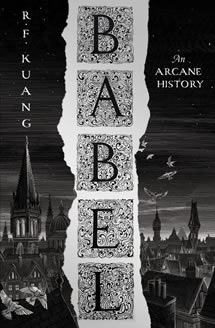Reviewed by Robert Goodman.
By RF Kuang, Harper Collins, $32.99.
 Fantasy author RF Kuang creates a fascinating alternate history of the British Empire in her stand-alone historical fantasy novel Babel. Situated mainly in the dreaming spires of Oxford in the nineteenth century, Babel explores issues of empire, colonialism and racism and asks questions that are just as relevant today. But it does so in a “safe space” of fantasy, where the author creates the rules and uses those rules to dig deeply into her themes and concerns.
Fantasy author RF Kuang creates a fascinating alternate history of the British Empire in her stand-alone historical fantasy novel Babel. Situated mainly in the dreaming spires of Oxford in the nineteenth century, Babel explores issues of empire, colonialism and racism and asks questions that are just as relevant today. But it does so in a “safe space” of fantasy, where the author creates the rules and uses those rules to dig deeply into her themes and concerns.
The plot of Babel centres around a young Chinese man whose birth name we never learn. Taken to England from Canton as a boy by his benefactor Professor Lovell, Robin Swift, as he comes to call himself, is trained to enter the Royal Institute of Translation at Oxford. The Translation Institute is needed as it drives the magic that in turn powers Britain and the British Empire. And that magic, using silver, is based on language, in essence, the small shifts in meaning between two words in different languages. Robin soon finds that Britain is using its power to gather the world’s silver to itself and further consolidate its influence.
Babel is something of a magical academy novel. The story follows Robin and his three classmates through their three years at Oxford, making their way through various personal and academic tribulations. Not least of which because three of them are non-white and two are women. Kuang herself attended Oxford and it may well be that the students’ feelings – of intense belonging coupled with being never let forget that you are an outsider – informed this aspect of the story. But it is so much more than this – a contemplation of the excesses of Empire, of cultural imperialism, and of prejudice in many forms.
Central to the novel is Kuang’s ingenious translation-based magic system. Again, by putting her characters through the academic process she allows her readers to learn as they do. But she also gives the text the feeling of a linguistic text with footnotes and asides. By creating a world that is dependent on this magic, she also gives her characters power to make change if they want to, a power that was not afforded to young people like these in the “real world” of nineteenth century Britain.
While Kuang delivers memorable characters and plenty of action, Babel is by its nature a fairly expository novel. But the magic of Babel is that it works as a fantastical translation of history into a different idiom. And in doing so it will make readers think differently about the world we came from and the world we have now.
Over 850 more reviews can be found on Pile by the Bed.











